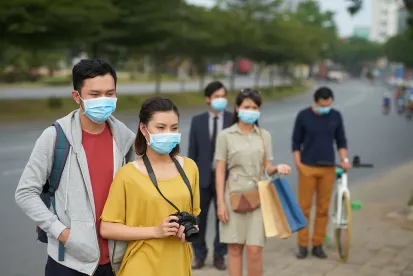The coronavirus disease 2019 (“COVID-19”) outbreak that started in December 2019 has stirred novel responses globally, including Chinese cities that are homes to millions of people being sealed off before the Chinese New Year of 2020 and the U.S. government imposing mandatory quarantine restrictions, reported to be the first since the smallpox outbreak in the 1960s.
During this period, China has imposed travel restrictions and mandatory quarantines, ordered public holiday extensions, delayed business resumption, closed factories and schools, and enforced separation controls, among other actions. Sectors such as manufacturing, transportation, energy, tourism, retail, and financial services in China are seriously affected.
Given China’s renowned position in the world order of manufacturing, this article looks at some of the employment law considerations underpinning the outbreak containment measures that have been ordered and implemented by the Chinese government. At the same time, the Standing Committee of the National People’s Congress of China has indicated that the virus outbreak may constitute a force majeure event where parties fail to perform their contractual obligations.
Compliance with outbreak measures by employers
The key governmental outbreak measures that will impact employers the most are the public holiday extension and delayed business resumption orders.
On January 27, 2020, the State Council of China extended the Chinese New Year holiday from January 30, 2020 to February 2, 2020 across the country. In certain cities and provinces such as Shanghai, Jiangsu, Zhejiang, and Guangdong, the local governments have further ordered delays of business resumption to February 9, 2020, or a later date, except for those enterprises that are essential to city operation, epidemic prevention and control, and basic necessities of the people. In general, re-commencement of business before the relevant announced date will be subject to regulatory approvals.
The central and local governments of China are authorized under Chinese law to take measures to respond to a public health emergency, such as an epidemic outbreak. In general, all enterprises are obliged to comply with such measures under the PRC Law on Prevention and Treatment of Infectious Diseases and the PRC Law on Emergency Responses or be subject to monetary and non-monetary penalties, including suspension of business operation and fines or, in serious cases, imprisonment of the relevant responsible persons.
Payment of remuneration to employees
The “extended holidays” mentioned above are regarded as “rest days” by some local authorities in the regime of employment law in China. “Rest days,” as defined in the PRC Labor Law, are not to be counted towards annual leave. The employees are not required to work on rest days but are entitled to their regular level of remuneration. Employees who work during the extended holiday period are entitled to compensatory time off or two times their regular level of remuneration.
As with the delayed business resumption order, local Chinese governments have provided varying guidance, with some examples set out below:
-
Shanghai city: the delayed period is considered “rest days,” and the requirements under Chinese labor laws are as explained above;
-
Suzhou and Wuxi cities: regular level of remuneration is required to be paid as if the employees have worked during such delayed period; and
-
Guangdong and Shandong provinces: the delay period is a “suspension of work and operation” of the employers, and the employers are required to pay the employees their regular level of remuneration if the suspension is shorter than one payroll cycle, i.e., the length of time between payments of two consecutive payrolls. If the suspension is longer than one payroll cycle, the employers are required to pay their employees basic living expenses of no less than the local minimum wage.
Employees unable to work due to mandatory quarantine
The Ministry of Human Resources and Social Security of China has specifically mandated that any person unable to attend work because they have identified as having been “infected,” “suspected” of infection, or been in close contact with COVID-19 and required to undergo mandatory quarantine or other government-imposed mandatory measures, , must bepaid his or her regular level of remuneration. In addition, an employer may notterminate the employment contract with such employee and must extend any employment contract with such employee that is due to expire during the relevant period (until such period ends).
If an employee is unable to return to work after a mandatory quarantine or other mandatory measure, and is in need of medical treatment, then such employee is (generally) entitled to three to 24 months of “sick leave” with a medical certificate. Remuneration to such employee during the “sick leave” shall be paid in accordance with the applicable labor laws.
Employees unable or unwilling to work due to the outbreak
An employee may not be able to return to work on time due to travel restrictions or other situations caused by the virus outbreak. Such a circumstance may constitute a “force majeure” event pursuant to PRC Contract Law, and relief may be available to the employee for performance of his or her labor contract. On the same ground, the employer may withhold payment of salary to such employee. An employee who is absent from work without a proper cause may be acting in violation of the management policy and, therefore, the terms of the labor contract, which may lead to termination of the employment.
The COVID-19 outbreak has taken China like a storm and resulted in novel emergency administrative and regulatory countermeasures from the local Chinese government. To mitigate the risks of employment disputes, we encourage that employers explore consensus labor arrangements with their employees by remaining flexible and providing support in compliance with local regulatory and practical requirements.






 />i
/>i

